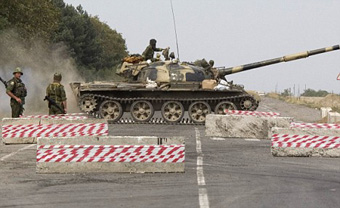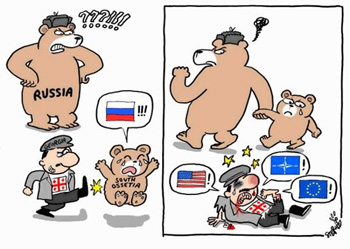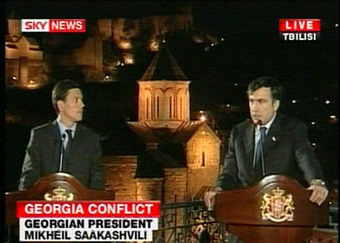The BBC, from which we've seen some blatant bias lately, employs the headline "Putin blames US for Georgia role" in large type. Whilst a neutral word by definition, "blames" certainly has defensive connotations to me.
Of course the White House stoicly denies this, charging that Putin's assertion is "patently false" and "not rational", so it really comes down to a matter of their word against the Kremlin's. If you believe that the White House is run by a group of lying war criminals led by a man whom several Democrats, a former presidential candidate and 30-50% of the American people are attempting to impeach, it seems logical to take the Russians' word for it. If the Western mainstream media don't manage to convince you otherwise, that is.

In fact, I've been rather disappointed lately that every piece of Western reportage I've seen on the subject has all but assumed Russian wrongdoing. There is no debate over the issue nor any balance to the research, as there usually is in such matters. Whilst the majority of real people that I have spoken to at least agree with me that Russia is being bullied by the West after defending separatists from tyrannical treatment, the media are unilaterally overlooking the possibility that Putin's Medvedev's cabinet did the right thing.
I'm a cynic at heart and I am aware that a lot of media outlets have bias one way or the other, but I am starting to think that there is a little more to this than the usual slant.

Putin's claim that US soldiers were in the area during the conflict to stir up trouble on behalf of a Presidential candidate (I read McCain here; he likes wars and would jump at the opportunity to regenerate cause for one) doesn't seem quite so far-fetched when you consider the Republican party's propensity for lying and the fact that the US and its allies jumped on the provocation bandwagon so very quickly. But it's not just provocation any more.
I've already suggested that Western states are engaging in some cardinal hypocrisy. Over the past week various Western nations have loudly proclaimed disappointment at Russia's recognition of disputed South Ossetia as an independent region, going so far as to suggest that Russia is no longer worthy of its position in the G8.
We, the foreign ministers of Canada, France, Germany, Italy, Japan, the United States and the United Kingdom, condemn the action of our fellow G8 member.
British Conservative Party leader David Cameron added:
Having Russia as a member of the G8 at a time when her troops are still on the sovereign soil of another country, I think, is inappropriate.
The countries also said that the action is contrary to UN Security Council resolutions, completely glossing over the fact that four of these seven countries committed precisely the same offences just five years ago. (It should be noted that Georgia is part of the Iraqi invasion coalition, albeit non-belligerent after a recent defensive troop recall.)
French President Nicolas Sarkozy described Russia's move to recognise South Ossetia and Abkhazia as an unacceptable attempt to change borders, despite the fact that his own government is one of three veto power UN Security council members that controversially recognised Kosovan independence in February.
At least when Dick Cheney chimed in, he qualified that the "unjustified" invasive action was taken against a democratic nation:
That young democracy has been subjected to an unjustified assault and the international community has joined in condemning Russia's invasion of a sovereign, democratic neighbor and its recognition of Georgian regions of South Ossetia and Abkhazia.
The US government apparently believes that it's okay to invade two sovereign nations, depose their governments and install leaders more to their liking as long as those nations self-regulate in a manner different from itself. Personally I am a fan of democracy, but those countries which have for whatever reason gone down a different path have every right to follow it, whilst other nations have no right to interfere. American politicians seem to disagree; it's only unacceptable if the invaded country happens to share our political structure.

They're not alone. British Foreign Secretary David Milliband — no significant contribution from Gordon yet, evidently — warned Russia that it "must not start a new Cold War". In doing so, he played on the prevailing opinion of Western culture that the former Soviet state was the only aggressor in the original one. It is my belief that Western governments, with the help of the media, are seizing the opportunity to paint Russia in a dim light and prevent what some said was an imminent rise of international standing for the Eastern bloc nation.
In reference to an article written by Dmitry Medvedev, Miliband added:
The Russian president says he is not afraid of a new Cold War. We don't want one. He has a big responsibility not to start one.
To that, Mr Miliband, I submit that it is in fact the responsibility of everyone — involved and otherwise — to prevent a new Cold War. If he really does not want one, perhaps he should stay out of Russia's and Georgia's business and stop stirring up trouble.
And that goes for you too, George.
Discuss.